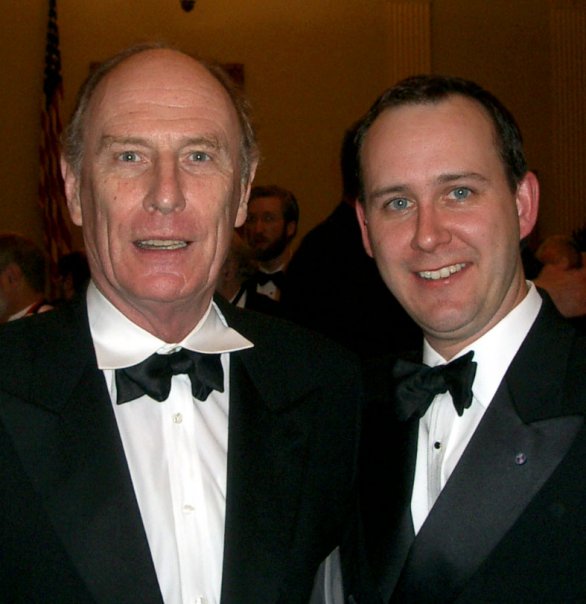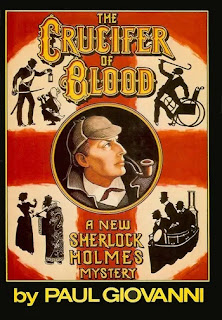“a well-staged performance” [VALL]
Actor and director Paxton Whitehead has died at the age of 85.
Born in Kent, England in October 1937, he began training at London's Webber-Douglas Academy of Dramatic Arts at the age of 17. He spent two years there then went to work in stock companies starting with the “weekly rep” — small touring companies that rehearsed and performed a new play each week.
Whitehead made his professional debut in 1956, and within two years was signed by the Royal Shakespeare Company. From there, he expanded into production and direction.
In 1961 With Doric Wilson, he produced And He Made A Her, Wilson's first play to be brought to the stage. Whitehead also directed and starred in this production at the off-off-Broadway venue Caffe Cino.
He made his Broadway debut in The Affair in 1962, after appearing on stage in Canada and TV productions. His Broadway work would not go unnoticed, as he would eventually be nominated for a Tony Award and Drama Desk Award for his portrayal of Pellinore in the 1980 revival of Camelot.
“the ‘Ragged Shaw’” [PRIO]
Beyond his work on the main stage, Whitehead threw himself into repertory work. From 1966 – 1977 he was the Artistic Director of the Shaw Festival, the second-largest repertory theatre in North America. The Shaw Festival at Niagara-on-the-Lake began as an amateur summer happening in 1962 to celebrate the life and spirit of George Bernard Shaw by creating theatre that is as entertaining and provocative as Shaw himself.
Under Paxton Whitehead's leadership, it developed into a professional international event.
Some of his notable appearances there included Magnus in The Apple Cart, Cusins in Major Barbara, Sergius in Arms and the Man, Lord Summerhays in Misalliance, Fancourt Babberly in Charley's Aunt, Tempest in the North American premiere of Alan Bennett's Forty Years On, and Hector in Heartbreak House with Jessica Tandy and Tony Van Bridge, a role he repeated at the Theatre Royal, Haymarket, London with Rex Harrison and Diana Rigg.
“our small stage at Baker Street” [PRIO]
Whitehead entered the world of Sherlock Holmes by way of The Crucifer of Blood, a 1978 play by Paul Giovanni loosely based on The Sign of Four, with elements of other Sherlock Holmes stories interspersed.The play ran at the Helen Hayes Theatre on Broadway from September 28, 1978 April 22, 1979, with Paxton Whitehead as Sherlock Holmes, Timothy Landfield as Dr. Watson, and Glenn Close as Irene St. Claire. It was nominated for four Tony Awards, including Giovanni for Best Direction of a Play, and won the award for Roger Morgan's lighting design.
Whitehead and Landfield previously starred in The Crucifer of Blood at the Studio Arena Theatre in Buffalo, NY) from January 6 to February 4, 1978.
As cited in The Baker Street Journal (Vol. 28, No. 4, 1978), it was “a delightful Victorian stew of conspiracy, sadism, racism, treachery, terror and murder for the whole family.”
At the 2007 BSI Dinner, Paxton Whitehead offered some reminiscences about the play.
 |
| Paxton Whitehead (left) with Scott Monty, BSI ("Corporal Henry Wood") at the 2007 BSI Dinner |
While Whitehead didn't make his film debut until 1986 in Back to School, starring Rodney Dangerfield, his screen career took off after that. He quickly became known to television audiences for his many guest appearances on several U.S. shows, especially on major sitcoms of the 1990s, such as Frasier, Caroline in the City, Ellen, 3rd Rock from the Sun, The Drew Carey Show, Mad About You, and Friends.
Our own favorite nod to his previous work in The Crucifer of Blood came via an insult hurled by Rodney Dangerfield's Thornton Melon in Back to School. Whitehead's Dr. Philip Barbay was indignant that the nouveau riche Melon could buy his way into the university. But Melon wasn't having it:
Paxton Whitehead's long stage career continued, and it was impressive. For a full look at his credentials, see his biography in the Internet Movie Database.
We'll miss this profoundly talented gentleman. As Dr. Watson observed of Sherlock Holmes in “A Scandal in Bohemia”:
“The stage lost a fine actor, even as science lost an acute reasoner, when he became a specialist in crime.”



0 comments:
Post a Comment